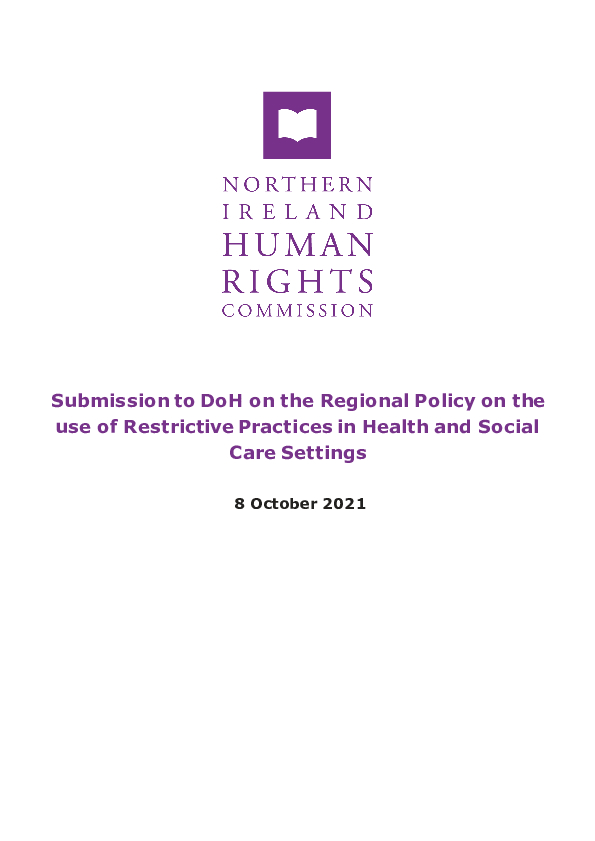NIHRC consultation response to Department of Health's Regional Policy on the use of Restrictive Practices in Health and Social Care Settings
Date produced October 2021
Below is a summary of the recommendations/messages
You can also download the full document through the links provided.
3.4 The Commission recommends amending the definition of restrictive practices at paragraph 5. from ‘those that limit a person’s movement, day to day activity or function’ to ‘deliberate acts on the part of other person(s) that restrict a person’s movement, liberty and/or freedom to act independently’.
3.5 The Commission recommends it is made explicit that the human rights framework underpinning the lawful and appropriate use of restrictive practises in health and care settings incorporates the full range of internationally accepted human rights standards ratified by the UK.
3.6 The Commission recommends the use of practical examples throughout Standard 1 to illustrate how the actions of health and social care staff might engage ECHR Articles 2, 3, 5 and 8 across the range of restrictive practises identified.
3.7 The Commission recommends setting out a clearly defined list of general principles that apply to the use of all restrictive practices in accordance with human rights standards. This should include:
- Initial attempts of restraint should as far as possible be non-physical;
- Restrictive practices should never be used to punish, to inflict pain or humiliation, or to replace proper care or treatment;
- There must be a real possibility of harm to the person or to staff, the public or others if no action is undertaken;
- The nature of the technique used must be proportionate to the risk of harm and the seriousness of that harm and be the least restrictive option that will meet the need;
- Any restriction should be imposed for no longer than absolutely necessary.
4.3 The Commission advises that, in order to ensure a robust human rights-based approach, the ‘Three Steps to Positive Practice Framework’ should explicitly incorporate human rights considerations at each stage.
4.6 The Commission recommends that adequate resources are allocated to ensure that staff within health and social care settings are adequately trained so that they understand the human rights implications of the use of restrictive practices, restraint and seclusion, including alternative measures to minimise or avoid their use. This training should be a mandatory and regular requirement.
4.10 The Commission recommends that the guidance clearly sets out how and when input will be proactively sought from the individual concerned, family members, caregivers or advocates, in all consultation, decision-making and monitoring processes regarding the use and minimisation of restrictive practices.
5.6 The Commission recommends that, in accordance with Concluding Observations of the UN CRPD Committee, it is made explicit that practices of restraint and seclusion should not be used for reasons related to disability.
5.11 The Commission recommends that specialised guidance is produced for the use of restrictive practices for children and young people, which makes it explicit that only techniques proven to be safe for children should be used, and only as a matter of last resort in circumstances where a child is at risk of harming themselves or someone else, and never for disciplinary purposes.
6.3 The Commission recommends that Standard 6 sets out the minimum reporting requirements for the use of any restrictive practice in health and social care settings in NI. This should include:
- the type of restrictive practice employed
- the date and the duration of the intervention
- the names of the staff and people involved
- reasons for using the type of restrictive practice employed (rather than an alternative less restrictive approach)
- whether the person or anyone else experienced injury or distress
- the person’s views of the incident (if appropriate, through family, caregiver or advocate)
- what follow-up action was taken
6.6 The Commission recommends that the Department of Health publishes an annual report on the use and governance of restrictive practices, restraint and seclusion in health and social care settings across NI, which contains disaggregated data on the frequency and impact of the restrictive practices in use and monitors the effectiveness of minimisation strategies.
7.3 The Commission recommends that the guidance clearly sets out at para 11.23 that the seclusion room must allow for staff to be able to continuously observe and hear the person within the designated room, and that the latter can fully see the staff member. It should be made explicit that video surveillance cannot replace staff presence.

Download Documents
Your browser is out-of-date!
Update your browser to view this website correctly. Update my browser now